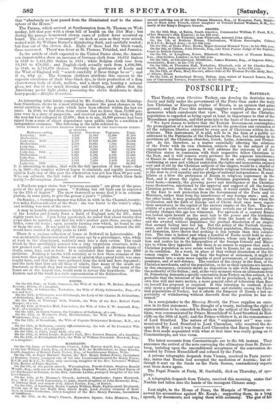POSTSCRIPT.:
SATURDAY.
That Turkey, even Christian Turkey, can develop its destinies more freely and fully under the government of the Porte than under the truly less Christian or European regime of Russia, is an opinion that gains ground ; and the Times this morning supplies a useful glance at present measures which corroborate that view. The support of the Christian population is regarded as being equal at least in importance to that of the Mussulman population, and that principle is the basis of the new measures. " We have reason to believe that the Turkish Government contemplates the promulgation of a most important act for the protection and extension of all the religious liberties enjoyed by every sect of Christians within its do- minions. This instrument, it is said, will be in the form of a public act addressed to the Patriarchs of the Churches in the East, but including in its provisions all the Christian churches, Greek, Latin, Armenian, and Protest- ant. As far, therefore, as a matter essentially affecting the relations of the Porte with its own Christian subjects can be the subject of an engagement to foreign powers, it will embrace the interests of all the Christian states in connexion with their respective fellow Christians in the East, and it will remove every pretence for the separate interference of Russia in defence of the Greek clergy. Such an edict, recognizing. and confirming at once and without restriction the rights and immunities enjoyed now and of old by the Christian subjects of the empire, would be a charter of religious toleration ; and a charter of absolute religious toleration in Turkey is the door to civil equality and the pledge of national independence. It anni- hilates at a blow the pretension of Russia to religious supremacy in the East, and it places the rights of the Christian population on their na- tural basis,-namely, the growing power and intelligence of the Christian races themselves, sanctioned by the approval and support of all the foreign Christian powers. So that, on the one hand, it would entitle the Churches of the East to seek protection from the Government of the Porte and its Ministers, rather than from the interference of any foreign state ; and, on the other hand, it may gradually prepare the country for the time when the civilization and the faith of Europe and of Christ shall once more regain their ascendancy in the capital of the ancient empire of the East. The pos- sibility of a pacific revolution of this nature reveals one of the most extra- ordinary changes this age has witnessed. For upwards of a century Russia has looked upon herself as the next heir to the power and the territories which were evidently slipping gradually from the hands of the Sultana, and she awaited without impatience the gradual. dissolution of an empire that seemed falling into her lap. But the policy of the Turkish Govern- ment, and the rapid progress of the Christian population, Slavonian, Greek, and Armenian, have shown that nothing is less certain than this calcula- tion. The time is indeed past when a handful of Turks could hold in abso- lute subjection millions of degraded Christians, whose only hope of protec- tion and justice lay in the interposition of the foreign Consuls. and Minis- ters to whom they appealed. But there is no reason to suppose that such a Christian population as now exists would look to Russia for an amelioration in its condition. In a word, in place of that violent dissolution of the Ot- toman empire which has long been the bugbear of statesmen, it might be transformed into a state more capable of good government, of national inde- pendence, and of self-defence. The conduct of the clergy in the East, of the Christian merchants, and of the population, as far as their opinions are known, in this emergency, certainly shows no disposition to aide with Russia against the authority of the Sultan ; and, at the very moment when an ultimatum from St. Petersburg demands a specific convention from Turkey on this subject, it is probable that the intention of the Sultan will be proclaimed, to grant, of his own free will and mere motion, a more general edict of toleration than Rus- sia herself has proposed or required. If this intention be realized, it not only opens a prospect of future improvement and stability among the Chris- tian populations of Turkey, but it affords the Emperor of Russia a last op- portunity of withdrawing without discredit from the position he has as- sumed."
In a surrejoinder to the Morning Herald, the Times supplies an omis- sion in its first statement. The draught of a treaty, including the right of representation to be conceded to Russia on the subject of the Greek cchris- tians, was communicated by Prince Menschikoff to Lord Stratford de &d- eli& on the 20th of April; and the Prince withdrew it, at the remonstrance of Lord Stratford. The nature of this " explanatory act " was com- municated by Lord Stratford to Lord Clarendon, who received the, de- spatch in May ; and it was from Lord Clarendon that Baron Brunow was thus first made acquainted with what at that time was really going on at Constantinople, not vice versa. t of a treaty, including the right of representation to be conceded to Russia on the subject of the Greek cchris- tians, was communicated by Prince Menschikoff to Lord Stratford de &d- eli& on the 20th of April; and the Prince withdrew it, at the remonstrance of Lord Stratford. The nature of this " explanatory act " was com- municated by Lord Stratford to Lord Clarendon, who received the, de- spatch in May ; and it was from Lord Clarendon that Baron Brunow was thus first made acquainted with what at that time was really going on at Constantinople, not vice versa.


























 Previous page
Previous page